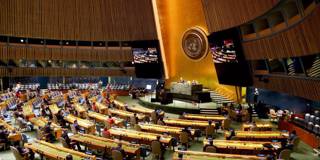The UN embodies the best of humanity – the belief that all people deserve basic dignity, and that working together is the only way to deliver it. Seventy-five years after its birth, the world – beginning with the United States – must revive that belief, and recommit to the multilateralism that it demands.
NEW YORK – As the United Nations marks its 75th anniversary, the world is in turmoil. The COVID-19 pandemic has resulted in nearly one million deaths so far and is nowhere close to being contained. The world economy is experiencing its worst recession since the Great Depression of the 1930s. Extraordinarily severe natural disasters, from floods to wildfires, are wreaking havoc on many countries. And the United States – long the world’s leading proponent of multilateral cooperation – is rejecting and even antagonizing its friends and partners. The UN, and the belief in global solidarity that it embodies, have never been more essential.
The UN was built on three pillars. The first was peace. Its overriding aim was to succeed where its ill-fated predecessor, the League of Nations, had failed: avoid another world war. Established at the dawn of the Cold War, the UN became an essential forum for dialogue; since the fall of the Berlin Wall, it has played an important peace-building role in several countries.
The second pillar was human rights. In 1948, the UN General Assembly approved the Universal Declaration of Human Rights, which set out for the first time the fundamental rights – including civil, political, economic, social, and cultural rights – that all countries were obliged to uphold. Though the mechanisms the UN created to protect those rights have a mixed record, there is no doubt that the UDHR was a major milestone in making human rights an international priority.

NEW YORK – As the United Nations marks its 75th anniversary, the world is in turmoil. The COVID-19 pandemic has resulted in nearly one million deaths so far and is nowhere close to being contained. The world economy is experiencing its worst recession since the Great Depression of the 1930s. Extraordinarily severe natural disasters, from floods to wildfires, are wreaking havoc on many countries. And the United States – long the world’s leading proponent of multilateral cooperation – is rejecting and even antagonizing its friends and partners. The UN, and the belief in global solidarity that it embodies, have never been more essential.
The UN was built on three pillars. The first was peace. Its overriding aim was to succeed where its ill-fated predecessor, the League of Nations, had failed: avoid another world war. Established at the dawn of the Cold War, the UN became an essential forum for dialogue; since the fall of the Berlin Wall, it has played an important peace-building role in several countries.
The second pillar was human rights. In 1948, the UN General Assembly approved the Universal Declaration of Human Rights, which set out for the first time the fundamental rights – including civil, political, economic, social, and cultural rights – that all countries were obliged to uphold. Though the mechanisms the UN created to protect those rights have a mixed record, there is no doubt that the UDHR was a major milestone in making human rights an international priority.